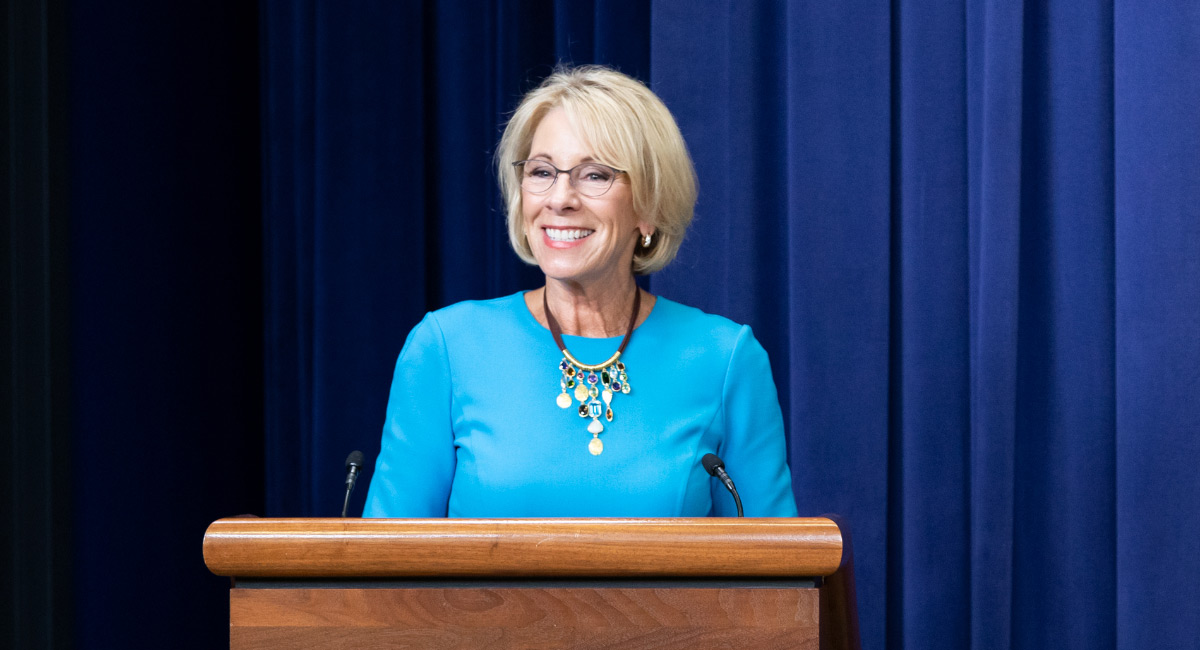The single most destructive thing that has happened to higher education in America is the federal student aid (FSA) programs of the past 50 years. Because of FSA, student higher education costs have soared, learning has declined, and higher educational attainment among lower income Americans, those who FSA was designed to help, has deteriorated in a relative sense. If America’s worst enemies wanted to weaken future generations of Americans, they could hardly do more damage than has been done by FSA.
Secretary of Education Betsy DeVos, along with Bill Bennett, the best of our Secretaries of Education, is abundantly aware of this and wants changes. In a speech to student financial aid administrators today, she has proposed some useful reforms designed to simplify FSA for student applicants as well as improve the abysmal administration of the program.
Specifically, DeVos wants to turn the FSA bureaucracy into an independent government corporation probably somewhat similar to the Federal Reserve, ultimately accountable to the public (unlikely the fiendishly designed Consumer Financial Protection Bureau) but free from daily control by politicians controlling the managers of the Department of Education. DeVos is that rare leader who actually wants to reduce her own power and the number of minions reporting to her at her redoubt in the heart of the Washington swamp.
Something needs to be done. Let me quote from DeVos’s speech today talking about the complexity of our FSA offerings: “Eight different repayment plans...each with different eligibility requirements. More than 30 variations of deferment and forbearance options. Fourteen forgiveness options. And 11 different servicers, all with totally separate websites....”
Think that is bad: it gets much worse. As DeVos puts it, “Is it any surprise...that both principal and interest are currently being paid down for only one in four loans? Nearly 11 million borrowers have loans that are delinquent or in default? And 43% of all loans are considered ‘in distress’?”
Almost everyone thinks the system needs major reform. Government has failed in its task, so DeVos wants to reduce its role, making FSA less governmental, more like lending in the vibrant private financial service sector. Why can’t FSA be more like, say, JP Morgan Chase or the Bank of America? Why can’t a bureaucracy that for at least a dozen years hasn’t been able to do something as modest as simplifying the FAFSA (Free Application for Federal Student Aid) form just go away and let someone else try to institute some sanity into FSA?
Is the DeVos proposal perfect? Absolutely not – indeed, far from it. However, perfection is not possible in the governance environment of today’s America. In a perfect world, we would support more (or only) private financing of student aid. We would make schools have skin in the game. We would impose minimal academic standards on borrowers. We would support non-degree certificated program participation. We would offer alternatives to borrowing, such as income share agreements.
The devil is in the details, and the DeVos speech does not give all of them. Merely turning federal student aid administration away from one federal bureaucracy (the Department of Education) to another (an independent corporation) will not wipe out all the problems endemic to rent-seeking public employment in a non-competitive environment with little or no market discipline. That said, however, adoption of this proposal (unfortunately unlikely in a bitterly partisan Congress to a considerable extent obsessed mainly with impeaching DeVos’s boss) could lead to some useful reforms: simplification of the FSA process, introduction of some modest commercial type banking standards, etc.
I once had a dream where I decreed a four step plan for the Department of Education. First, declare it out of business and order all employees and others to move safely away from its Maryland Avenue headquarters. Second, have the Air Force bomb the building out of existence. Third, have the Army Corps of Engineers clear away the debris. Fourth, build something genuinely promoting learning and wisdom, perhaps an extension of the Smithsonian Institution’s nearby Air and Space Museum. I think Betsy DeVos would join me in celebrating the department’s demise. In the short run, however, taking a baby step in that direction would be useful.












